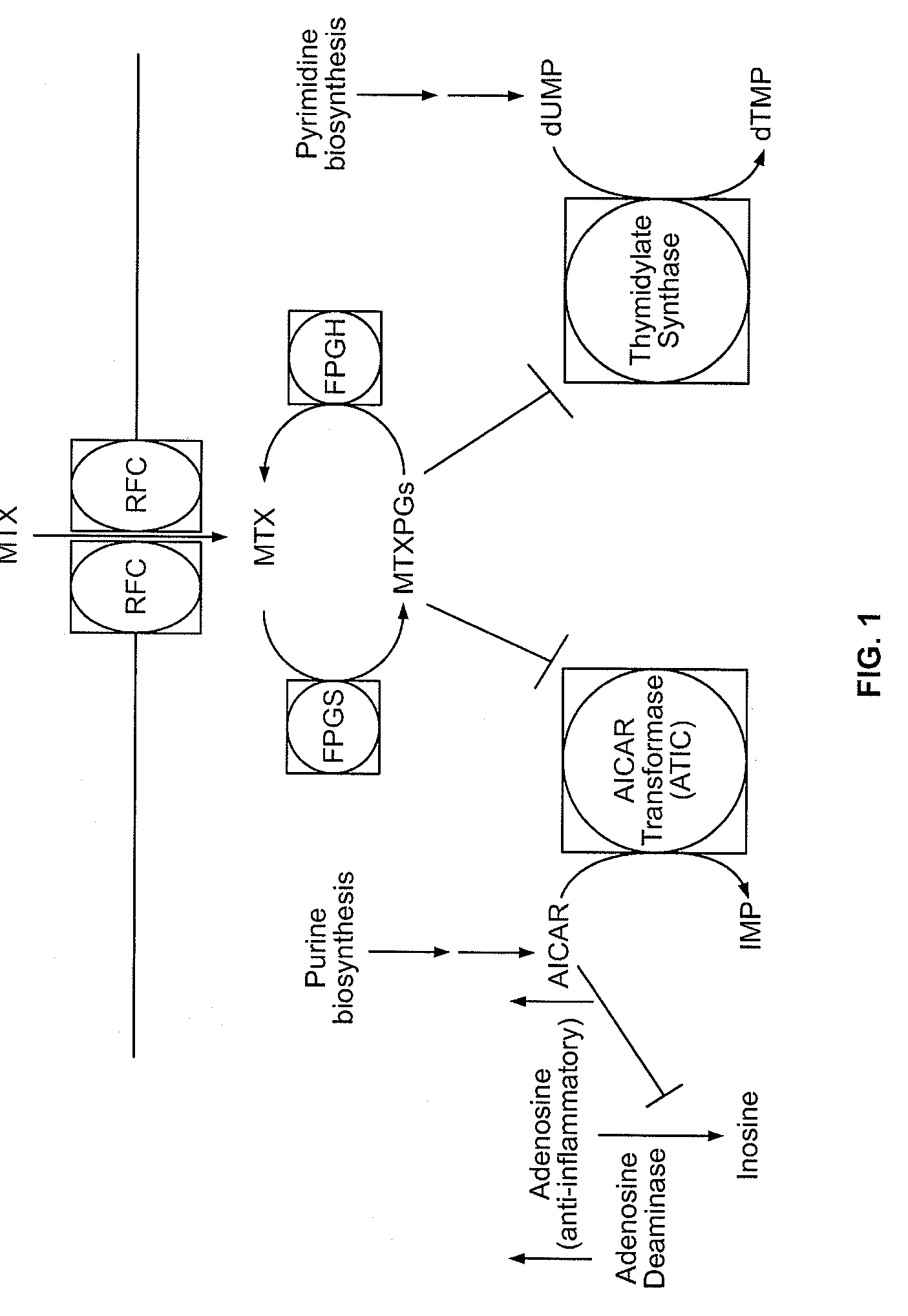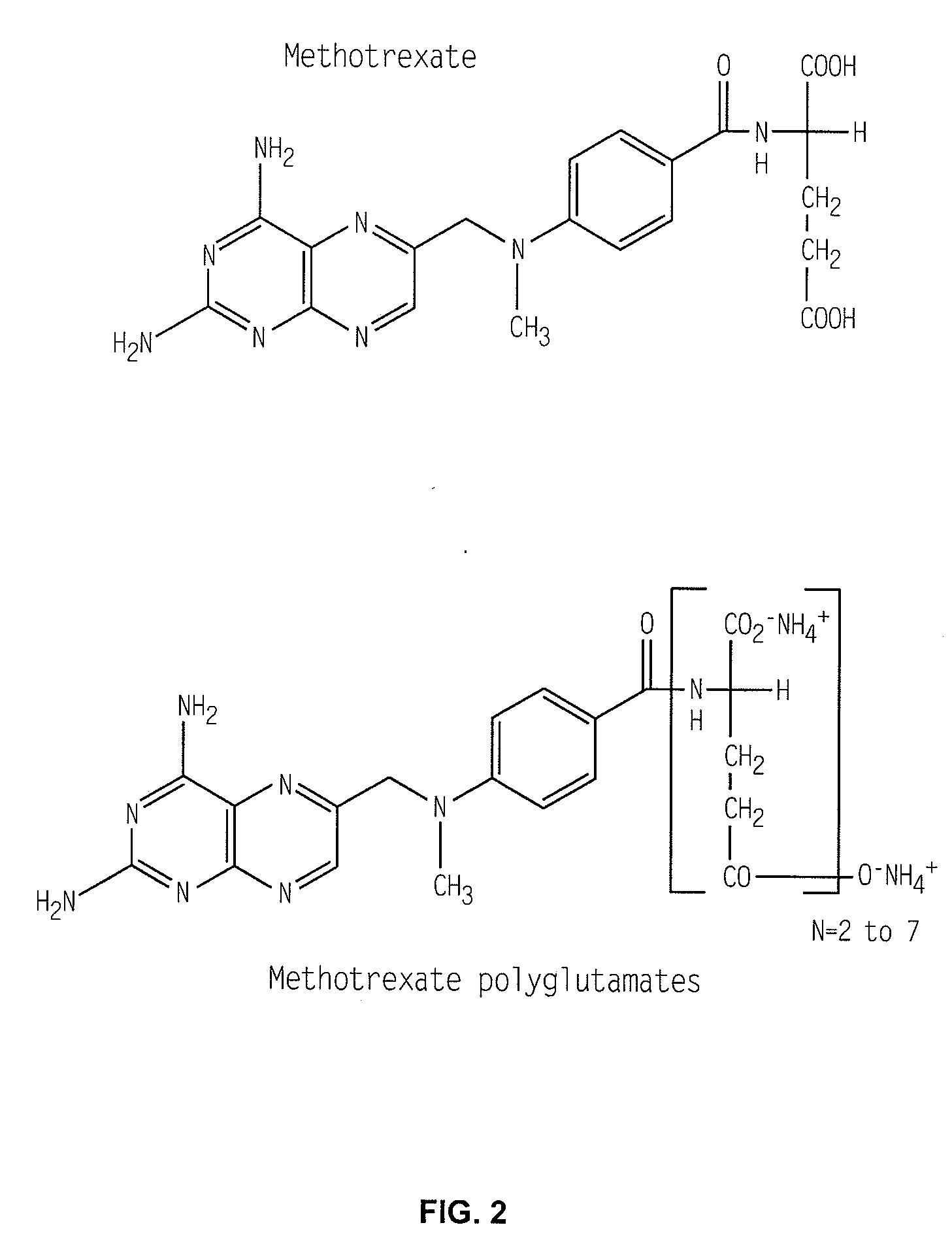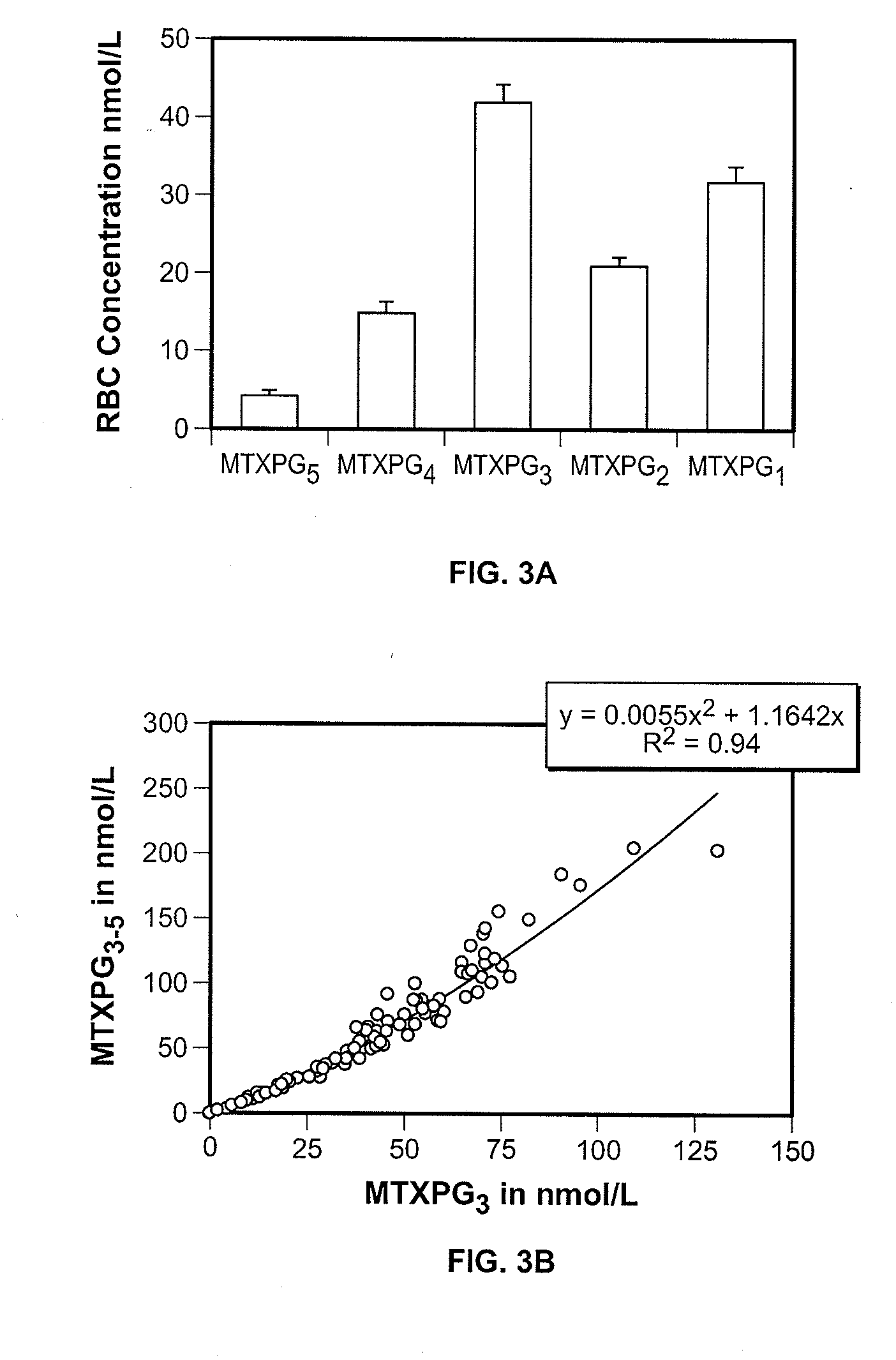Methods for optimizing clinical responsiveness to methotrexate therapy using metabolite profiling and pharmacogenetics
a metabolite profiling and clinical responsiveness technology, applied in the field of medical genetics, can solve the problems of inability to use as cofactors, dna biosynthesis, cell division, etc., and achieve the effect of increasing the amount of chemotherapy
- Summary
- Abstract
- Description
- Claims
- Application Information
AI Technical Summary
Benefits of technology
Problems solved by technology
Method used
Image
Examples
example 1
Methotrexate Tri-Glutamate Concentrations can Predict Clinical Responsiveness to Chemotherapy
A. Methods
[0253]In this cross-sectional study, eligibility was limited to patients of at least 18 years of age who met the revised criteria of the American Rheumatism Association for Rheumatoid Arthritis and had received low dose methotrexate therapy for at least three months. Some patients were on additional medications for rheumatoid arthritis, including low dose corticosteroids (<10 mg day), and folic acid supplementation (1 mg / day). The Institutional Review Board approved the study, and patient consent was obtained.
[0254]Patient characteristics were collected at the time of the enrollment in the clinical study. Clinical assessment included a tender joint count, a swollen joint count, a Physician's Assessment of Disease Activity (using a 10 cm visual analog scale (VAS)), and a Patient's Assessment of Physical Function using the modified-Health Assessment Questionnaire (m-HAQ). The mHAQ is...
example 2
Genetic Polymorphisms Associated with Superior Clinical Responsiveness to Chemotherapy
[0262]This example describes the identification of novel associations between genetic polymorphisms in the folate, de novo purine synthesis, and de novo pyrimidine synthesis pathways and clinical responsiveness to chemotherapy.
A. Contribution of the RFC-1 G80A Polymorphism to Clinical Responsiveness to Methotrexate Therapy
[0263]In the 108 patients, allelic frequency for the RFC-1 80A variant allele was 44%. The distribution of genotypes consisted of 34 / 108 (31%) patients with the homozygous wild-type genotype (RFC-1 80G / G), 53 / 108 (49%) heterozygous patients (RFC-1 80G / A) and 21 / 108 (19%) patients with the homozygous mutant genotype (RFC-1 80A / A). The twenty-one patients carrying the RFC-1 homozygous mutant genotype (RFC-1 80A / A) were compared to the eighty-seven patients carrying the non-homozygous mutant genotype, which was either wild-type or heterozygous (RFC-1 80G / G or 80G / A).
[0264]As shown in...
example 3
An HPLC System Suitable for Detection of MTXPGs in Samples from Individuals Undergoing Methotrexate Therapy
[0277]This example describes a chromatographic system, conditions, and reagents suitable for separation of methotrexate polyglutamates (MTXPGs) in cell samples.
A. Preparation of Reagents
[0278]4-amino-10-methylpteroylglutamic acid (methotrexate; MTXPG1) was purchased from SIGMA (St. Louis, Mo.). 4-amino-10-methylpteroyldi-glutamic acid (MTXPG2), 4-amino-10-methylpteroyltri-glutamic acid (MTXPG3), 4-amino-10-methylpteroyltetra-glutamic acid (MTXPG4), 4-amino-10-methylpteroylpenta-glutamic acid (MTXPG5; SEQ ID NO:12), 4-amino-10-methylpteroylhexa-glutamic acid (MTXPG6; SEQ ID NO:15), and 4-amino-10-methylpteroylhepta-glutamic acid (MTXPG7; SEQ ID NO:14) were purchased as ammonium salts from Schircks laboratories (Jona, Switzerland). HPLC grade acetonitrile was purchased from Fisher Chemicals (Fair Lawn, N.J.); hydrogen peroxide (30%, v / v), ammonium hydroxide, and glacial acetic ac...
PUM
| Property | Measurement | Unit |
|---|---|---|
| emission wavelength | aaaaa | aaaaa |
| excitation wavelength | aaaaa | aaaaa |
| wavelength | aaaaa | aaaaa |
Abstract
Description
Claims
Application Information
 Login to View More
Login to View More - R&D
- Intellectual Property
- Life Sciences
- Materials
- Tech Scout
- Unparalleled Data Quality
- Higher Quality Content
- 60% Fewer Hallucinations
Browse by: Latest US Patents, China's latest patents, Technical Efficacy Thesaurus, Application Domain, Technology Topic, Popular Technical Reports.
© 2025 PatSnap. All rights reserved.Legal|Privacy policy|Modern Slavery Act Transparency Statement|Sitemap|About US| Contact US: help@patsnap.com



